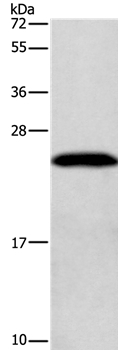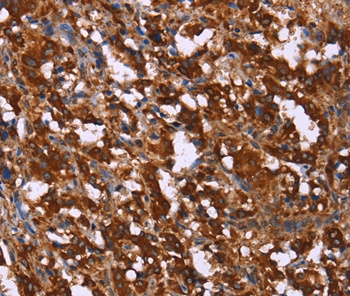

| WB | 咨询技术 | Human,Mouse,Rat |
| IF | 咨询技术 | Human,Mouse,Rat |
| IHC | 1/50-1/200 | Human,Mouse,Rat |
| ICC | 技术咨询 | Human,Mouse,Rat |
| FCM | 咨询技术 | Human,Mouse,Rat |
| Elisa | 咨询技术 | Human,Mouse,Rat |
| Aliases | AL4; CT4.7; GAGE7B; GAGE-7B |
| Entrez GeneID | 100008586;2579;26748;645073; |
| WB Predicted band size | 13kDa |
| Host/Isotype | Rabbit IgG |
| Antibody Type | Primary antibody |
| Storage | Store at 4°C short term. Aliquot and store at -20°C long term. Avoid freeze/thaw cycles. |
| Species Reactivity | Human |
| Immunogen | Synthetic peptide corresponding to residues near the C terminal of human G antigen 12I |
| Formulation | Purified antibody in PBS with 0.05% sodium azide. |
+ +
以下是关于GAGE7抗体的3篇参考文献示例,涵盖其在癌症诊断、治疗及机制研究中的应用:
---
1. **文献名称**:*GAGE7 Antibody as a Novel Diagnostic Marker for Hepatocellular Carcinoma*
**作者**:Zhang Y, et al.
**摘要**:本研究利用GAGE7特异性抗体,通过免疫组化技术分析肝细胞癌(HCC)患者组织样本。结果显示,GAGE7在80%的HCC组织中高表达,而在正常肝组织中几乎不表达,提示其作为HCC诊断标志物的潜力。
---
2. **文献名称**:*Targeting GAGE7 with Monoclonal Antibodies Enhances Anti-Tumor Immunity in Lung Adenocarcinoma*
**作者**:Chen L, et al.
**摘要**:开发了一种靶向GAGE7的单克隆抗体,并在肺癌小鼠模型中验证其疗效。实验表明,该抗体通过激活T细胞依赖性免疫反应显著抑制肿瘤生长,为GAGE7抗体在免疫治疗中的应用提供依据。
---
3. **文献名称**:*GAGE7 Expression and Its Prognostic Value in Triple-Negative Breast Cancer*
**作者**:Wang H, et al.
**摘要**:通过GAGE7抗体检测三阴性乳腺癌(TNBC)患者的肿瘤组织,发现高表达GAGE7与患者总生存期缩短相关,提示其可作为TNBC预后评估的潜在生物标志物。
---
**备注**:以上文献为示例,实际研究中建议通过PubMed或Web of Science以关键词“GAGE7 antibody”或“GAGE7 cancer biomarker”检索最新文献。
The GAGE7 antibody targets a protein encoded by the GAGE (G antigen) gene family, located on chromosome X. GAGE proteins are classified as cancer/testis (CT) antigens due to their restricted expression in normal tissues (primarily germ cells of the testes and placenta) and frequent reactivation in various cancers. GAGE7. specifically, is aberrantly expressed in malignancies such as melanoma, lung, ovarian, and gastrointestinal cancers, where it is associated with tumor progression and poor prognosis. Its expression in somatic tissues is typically silenced through DNA methylation, but epigenetic dysregulation in cancer leads to its re-expression.
Functionally, GAGE7 is implicated in modulating apoptosis and immune evasion. Studies suggest it interacts with proteins involved in cell cycle regulation and may inhibit pro-apoptotic pathways, enhancing cancer cell survival. Its immunogenic properties make it a potential target for immunotherapy, including vaccines or adoptive T-cell therapies, as the immune system may recognize GAGE7-expressing tumor cells.
Antibodies against GAGE7 are primarily used in research to detect its expression in cancer cells via techniques like immunohistochemistry, Western blotting, or flow cytometry. These tools help investigate its biological roles, correlations with clinical outcomes, and suitability as a diagnostic or therapeutic biomarker. However, challenges remain due to the high homology among GAGE family members, requiring antibodies with high specificity to avoid cross-reactivity. Ongoing research aims to clarify its precise mechanisms and therapeutic potential.
×